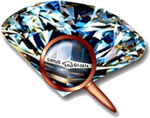Dear Umbra,
Help! I am getting married soon and I need to know what I should do about rings. I know that mining for metals and gems is very destructive, and I am also concerned about supporting civil war in Africa through a diamond purchase. Is my only environmentally friendly option to forgo the engagement and wedding rings?
Thanks,
Kathleen,
Oakland, Calif.
Dearest Kathleen,
Good for you for caring, and congratulations on your wedding. Your environmentally friendly options are either no rings — and if I had a nickel for every married American woman who doesn’t wear a ring, I’d have at least 35 cents — or used rings. (Usually, for PR purposes, those are called “antiques.”)

Gold mining is the pits.
For new rings — well, as Hemingway said about a related topic, “The Earth moved.” From California to Sierra Leone, landscapes have undergone wrenching alteration in the name of adornment. Metal miners move massive amounts of water and earth to get at a handful of shiny stuff — possibly the starkest illustration of the way people destroy the natural environment (and, often, nearby human communities) in order to make a buck. As large veins are sucked dry, it gets harder to find precious metals. A popular technique these days involves piling excavated earth into giant holding pools and spraying it with sodium cyanide, leaching out the precious metals. Naturally, the toxics escape into nearby groundwater, destroying habitat and contaminating drinking water. And have all the gold and diamonds in the African earth brought food and peace to the people? It sounds like you already know the answer to that one.
I think I’ll stop with the depressing recitation. You are in love, you want to honor a tradition, you want to walk around with a ring on your hand and think about your hunky husband. You don’t want to think about misery in Sierra Leone. However, maybe thinking about the origins and implications of the ring tradition will help you decide whether you want one, and, if so, how to go about getting it.
Back when marriage was more of an economic arrangement than it is today, a gift of jewelry to the bride was a sort of down-payment. An incredibly expensive ring capable of reassuring you of your husband’s vast resources and your own monetary worth may not be necessary in the modern era. As for the social cachet of engagement rings: The idea that a diamond is “a girl’s best friend” that will “last forever” was developed by the DeBeers Diamond Monopoly Company to help dig it out of the Great Depression. You’re too canny to fall for such blatant marketing ploys, so perhaps you can put aside your envy of J. Lo’s rock.

The Sirius polar bear.
Do you need a new ring that no woman has worn before, a ring mined just for you by unhappy Angolans? Does a new ring say “love” in a more ringing voice than an old (er, antique) ring? Eschewing a new diamond will ensure that you don’t perpetually have blood on your hands from wearing a conflict diamond — one that was sold to finance African civil wars. (The only diamonds currently guaranteed to be blood-free are Canadian diamonds, mined in the frozen north and sold by some civically minded companies, including Sirius and Auria.) And it will demonstrate your commitment to the second motif in the Reduce, Reuse, Recycle mantra.
I hope that someone in your family, or a beloved friend, has a ring to pass on to you. If not, there are great, affordable, antique jewelry stores all around our fair world. And then there are always options for the creative-minded, untraditional types: I have a friend (who may or may not work on one of the upper floors of Grist) who, when preparing an elaborate woodland scavenger hunt/marriage proposal, wasn’t sure if his beloved wanted a ring. He rifled through her jewelry box and presented her with a ring he found there. She was ecstatic. After all, in the end, it’s not the actual ring: It’s the meaning enclosed within. That’s something you can’t buy from a jewelry store.
Lovingly,
Umbra


